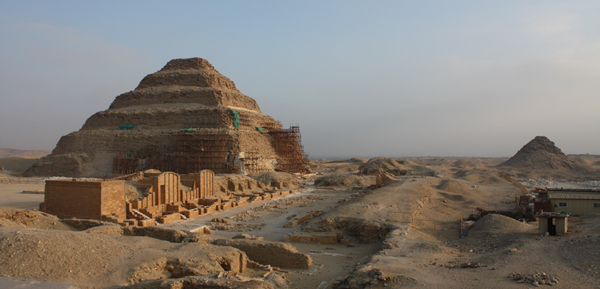Greeting
Cultural properties throughout the world are in danger, so it is critical to take immediate measures. Kansai University has been examining techniques to best preserve and restore cultural heritage from the viewpoints of heritage science, Egyptology, natural history, city planning, geotechnical and structural engineering, analytical chemistry, microbiology, and high polymer chemistry. Based on the achievements in these efforts, we have launched a project to establish a new academic discipline, “Integrated Studies of Cultural Heritage.”
The Center for the Global Study of Cultural Heritage and Culture (CHC) will pursue the following goals: 1) to aid in the development of future specialists specifically trained for restoration work at cultural heritage sites and improve their skills with the help of domestic experts in cultural heritage restoration, 2) to enhance restoration techniques based on Japan's advanced science and engineering technologies, 3) to promote cross-cultural studies, focusing on Egypt and Europe, in order to overcome cultural biases in restoring cultural heritages, and to apply this knowledge to the actual restoration work, and 4) to organize lectures covering new preservation techniques and relevant findings in the field.
In the research activities primarily on Egyptian cultural heritage, the CHC will deploy Kansai University's collective human resources, domestic and international networks, and facilities. The research will be conducted in the following four groups, which will be working closely together and complementing each other with specialized techniques. (1) The Cultural Heritage Restoration Group, a group of heritage scientists, will utilize various techniques to preserve cultural heritages. This group will be also responsible for training restoration specialists, enhancing their skills, and promoting continuing education by offering workshops for future restoration specialists. 2) The Egyptology and Egyptian Society Group will work on elucidating the ancient and modern Egyptian cultures, understanding of which will be fundamental to restoring their heritage. 3) The Science and Technology Group will apply Japan's advanced science and engineering technologies to cultural preservation. Finally, 4) the International Culture Group will examine the influential cultures of Europe and the United States and propose effective approaches to the restoration of cultural heritages for future, multilateral research.
Our project is led by internationally renowned experts from Japan, Egypt, and Poland in various disciplines. Kansai University's growing networks across national borders will surely connect research projects underway in different countries, regardless of whether the projects are in humanities or science.
At the beginning of 2011, the Egyptian president, Hosni Mubarak's nearly 30-year political reign collapsed. The political climate in Egypt has been volatile, and it has been reported that cultural properties there have been robbed and damaged. Cultural properties in countries outside of Egypt are also in danger due to abrupt revolutions and wars. Under the current circumstances where taking action on-site is almost impossible, what should the CHC do as a “global” center? What can we do? Rapid changes in this global society will urge us to define the role of our research as we move forward.
The CHC at Kansai University is dedicated to promoting global research efforts which integrate the humanities and the sciences and will strive to establish the field of integrated studies of cultural heritage, which will contribute to the preservation of cultural heritages at risk. We appreciate your continuing support.
August 6, 2013
Hiroshi Suita
Director, Center for the Global Study of Cultural Heritage and Culture

Step Pyramid in Saqqara
From April 2013 to March 2018, the Center for the Global Study of Cultural Heritage and Culture has proceeded various activities with your support and understanding. We would like to express our sincere appreciation for your interest towards our research activities and various events. Though the center is going to close the five-year project, we would like to keep developing the activities based on the results of the center. I would like to ask for your continuous support for our activities.
March 31, 2018
Hiroshi Suita
Director, Center for the Global Study of Cultural Heritage and Culture

